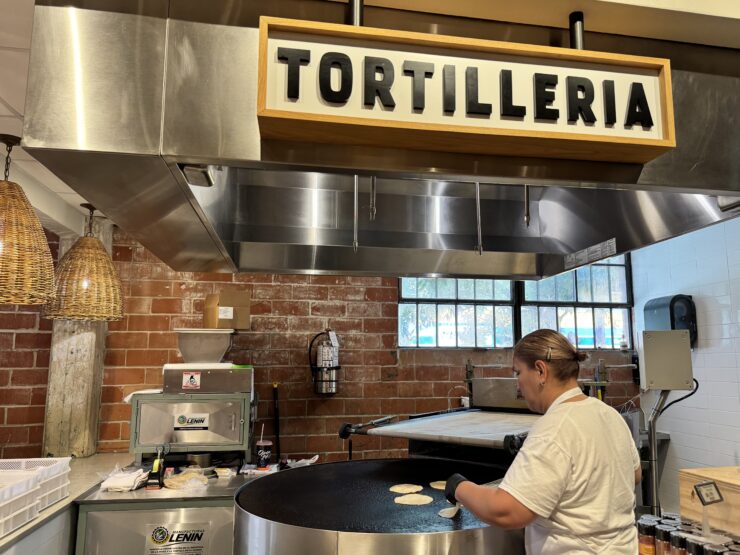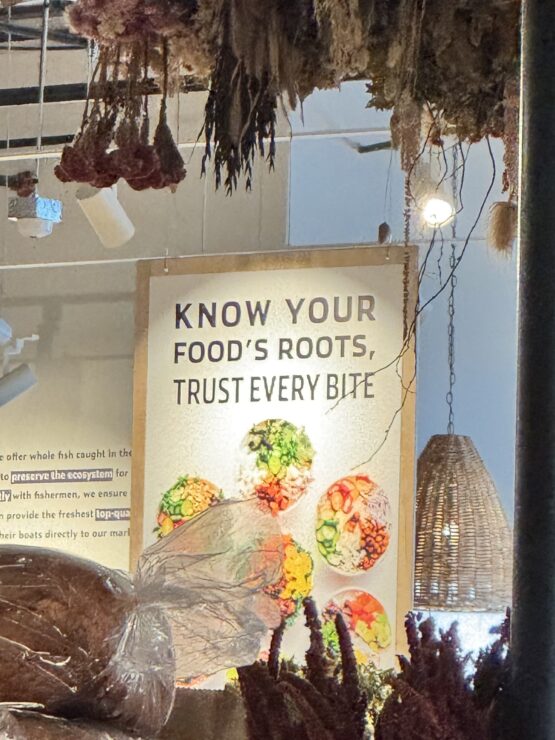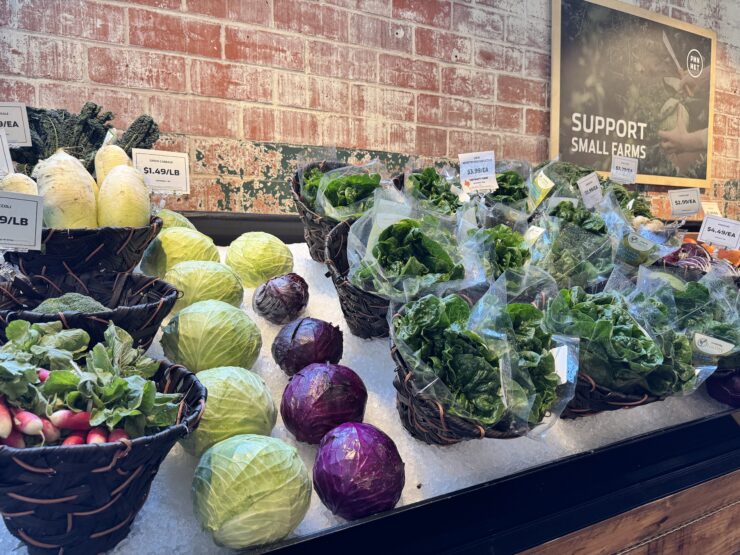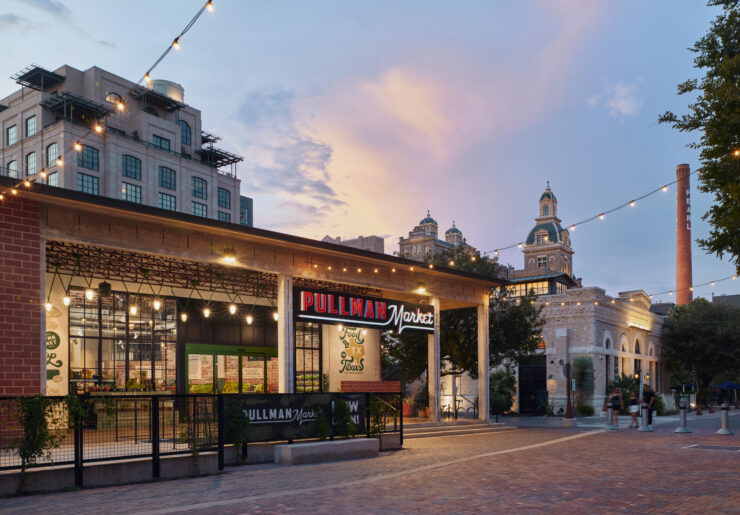Walk into Pullman Market and you immediately notice the irresistible aroma of freshly baked sourdough bread. Inside, there’s vibrant produce like crisp heads of violet cabbage and lush clusters of heirloom lettuce. A fishmonger’s case features whole red snapper. The butcher counter showcases meats cut and prepared on site, like Black Angus tenderloin, short ribs, and dry-aged Tajima Wagyu ribeye. Signs throughout proclaim the products’ Texas origins.
Pullman Market opened in 2024 in the Pearl, a historic restaurant and shopping district in San Antonio. The 40,000 square foot market and restaurant space resides in the former Samuel Glass Company headquarters. Original materials and patina inside the building merge with new elements seamlessly. Preserving the original framework kept tons of waste from local landfills, while preserving the building’s historic roots.
That commitment to reducing waste is carried throughout the entire operation of Pullman Market, demonstrating an unusual commitment to sustainability and supporting its local community. Central to its purpose is a focus on reducing food waste, a challenging issue across the food industry. At Pullman Market, sustainability is an integral part of the daily operations of its grocery, restaurants, and eateries.
Where Taste Meets Purpose: Chef Danny Parada

Danny Parada, Corporate Chef, described the market’s philosophy about food. “Great food starts with respect: for the ingredient, the producer, and the community it serves. From heirloom grains and day-boat seafood to whole animals sourced from ranchers we know personally, everything we do is rooted in transparency and sustainability. We want guests to taste the story of Texas in every bite.”
Parada said Pullman Market’s design invites people to experience food in every form, whether buying local produce, enjoying a quick bite, or sitting down for a fine dining experience. “By bringing everything under one roof, we close the gap between the farmer, the chef, and the guest. It’s about making sustainability accessible while celebrating the joy of food.”
His journey to Pullman Market began when he joined Emmer & Rye Hospitality Group in 2015, where he learned about the importance of whole-animal butchery, fermentation, and building relationships with local farmers. He further honed his skills in Sydney and Chicago before returning to Texas.
“I came back to Texas inspired by how food can connect communities and excited to continue my work with Emmer & Rye Hospitality Group,” he said.
One of the things that Parada loves about Pullman Market is how the market and restaurants work together.
“The creativity,” he said. “Being able to draw from the market, collaborate across teams, and let one concept inspire another keeps the work fresh and rewarding.”
Every Ingredient Has a Purpose

At Pullman, every ingredient has a purpose. The market takes a whole-system approach to minimize waste across its grocery, bakery, restaurants, and eateries.
“That means grinding bones into stock, turning leftover dough into crackers, or using animal fats in our tortillas,” Parada said. “Nothing leaves our kitchen without us asking, How else can we use this?”
He gave an example using beef from one of their partners, Startz Cattle Company.
“Steaks might be featured at Mezquite and Isidore (restaurants), ground beef becomes burgers, shanks and tails are slow-cooked into ragu at Fife & Farro, and bones go into stock at Isidore. Even the tallow is used in tortillas or confit, ensuring the entire animal is celebrated.”
Sourcing plays a significant role in this process. Parada said the Market selects local farmers, ranchers, and producers who share their values around quality, sustainability, and transparency. Many relationships are long-standing, dating back to Emmer & Rye’s opening in Austin in 2015.
“We also love discovering new producers whose work reflects the incredible diversity and quality of Texas agriculture,” he said.
Menu planning, portion sizing, and creative repurposing are central to the market’s food waste reduction strategy.
“Careful planning ensures we only bring in what we can use, while creative repurposing lets us transform trim or byproducts into something entirely new for our guests,” Parada said.
From Staff to Guests: A Shared Mission

Education is central to Pullman Market’s approach to reducing waste. Parada explained that empowering staff means showing them that every ingredient has value. Guests are also educated. Open kitchens, visible butchery, and storytelling on menus help them understand why the market’s efforts matter.
Scale is one of the biggest challenges at Pullman, since operations span grocery, bakeries, quick-service counters, and restaurants all at once. But it also provides flexibility. If something is not sold in the market, it can find a home in a restaurant dish or staff meal. Unsold food is either used for staff meals or donated to local partners, like Trosi Farms, which transform the waste into nutrient-rich soil for their crops.
Parada also wanted to dispel a common misconception that sustainability is too expensive or merely a trend.
“We work hard to make sustainable choices accessible, from offering a range of price points in our eateries to showing guests how every cut or byproduct can be celebrated, not discarded.”
A Model for the Future of Food

The market’s sourcing and waste reduction efforts extend beyond its own operations, impacting the local community. “They help strengthen local food systems and keep dollars within our community,” Parada said. “We’re creating demand for Texas-grown products and reducing the burden on landfills.”
Looking ahead, Parada sees food waste reduction continuing to move toward accessibility. He hopes this will make local food and sustainable practices the norm, rather than the exception. “The more transparent and collaborative the industry becomes, the stronger we all are,” he said.
Pullman Market demonstrates that scale and sustainability are not mutually exclusive. Parada hopes others will see their approach and adapt it to their own operations, whether large or small.
Pullman Market’s Lasting Impact
Pullman Market is more than just about food; it is about serving the community. “We hope every guest leaves not just full, but also inspired by the connection between the land, the producers, and the plate,” Parada said. From sourcing local ingredients to reducing waste in its grocery, bakery, and restaurants, Pullman Market leads by example.
Even at this scale, thoughtful intention and sustainability remain at the heart of its mission.
If You Go
You’ll find the Pearl in midtown San Antonio, just north of the Museum Reach on the River Walk. The Pullman Market is located at 221 Newell Ave. on the south end of the Pearl District.
Pullman Market offers an immersive experience for visitors, with a specialty grocer, a sourdough bakery, a whole-animal butcher, four restaurants, and five quick-service eateries. Each venue celebrates the seasonality and local sourcing, offering dishes that highlight fresh, seasonal ingredients.
Restaurants include:
- Fife & Farro – Italian restaurant featuring wood-fired sourdough pizzas and handmade, heritage grain pastas
- Mezquite – Serves grilled meats, flour tortillas, and cocktails
- The Mezcaleria – Offers appetizers, bowls, tacos, burritos, and quesadillas
- Isidore – Menu includes small plates, upscale entrees, and a raw bar
- Nicosi – High-end dessert bar with seasonal tasting menus
Quick-service eateries include:
- Burger by the Butcher – Burgers made with fresh ground beef Texas Angus and Wagyu Cattle
- Greens & Grains – Offers a variety of salads and grain bowls
- Ceviche – Showcases snapper, yellowfin tuna, and Gulf shrimp. Serves several varieties of ceviche, tacos, and fresh oysters
- Ice Cream – All dairy ingredients are sourced from Texas farms
- Coffee – Uses locally sourced roasted beans and features several house-made syrups and handmade imported chai tea
For more information about Pullman Market: https://www.pullmanmarket.com
You may also enjoy reading:
In Galveston, Three Places to Quench a Texas Thirst
Fredericksburg, Texas: Wildflowers and Wine (Peaches, too!) in Texas Hill Country
Taste the Spirit of Texas at the Brazos County Farmers Market

